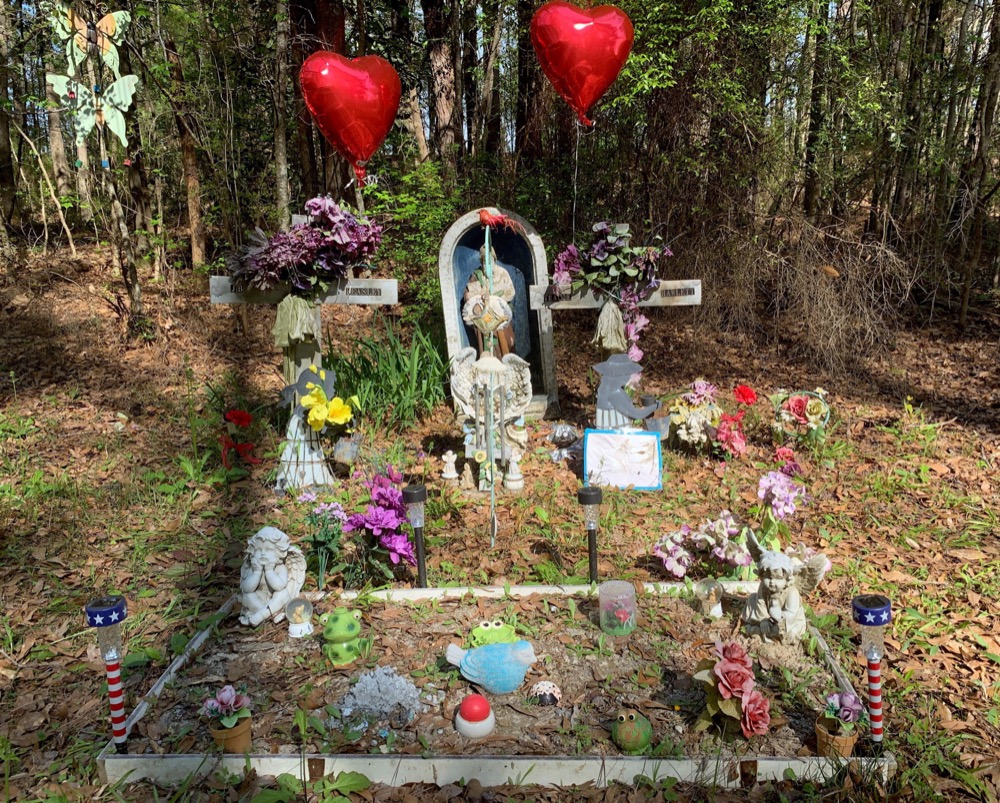OZARK, Ala. (AP) - The wife of an Alabama man charged with capital murder in the slaying of two teenage girls nearly 20 years ago said Wednesday that he's innocent of the killings that terrified the small southern city.
Jeanette McCraney defended her husband, 45-year-old Coley McCraney, during a news conference not far from the jail where her husband is being held without bond charged with the 1999 slayings of Tracie Hawlett and J.B. Beasley.
"I'm here to let you know that the man behind those bars, he's innocent," Jeanette McCraney said as she spoke to reporters with family members standing behind her. "I know he didn't do it. I can honestly tell you my husband is innocent."
 A memorial to two Alabama teenagers killed in 1999 stands beside a road at Ozark, Ala., on Tuesday, March 19, 2019. Coley McCraney, 45, of Dothan was arrested on capital murder charges in the deaths of Tracie Hawlett and J.B. Beasley, both 17. Their bodies were found in a car trunk at the spot of the memorial. Both had been shot in the head. (AP Photo/Kim Chandler)
A memorial to two Alabama teenagers killed in 1999 stands beside a road at Ozark, Ala., on Tuesday, March 19, 2019. Coley McCraney, 45, of Dothan was arrested on capital murder charges in the deaths of Tracie Hawlett and J.B. Beasley, both 17. Their bodies were found in a car trunk at the spot of the memorial. Both had been shot in the head. (AP Photo/Kim Chandler)
Jeanette McCraney said her husband, a long-haul truck driver and part-time preacher, is the "stronghold" of the family, describing him as a man who pushed his children to succeed academically and quizzes her on Bible history. She said he is also an Air Force veteran.
Jeanette McCraney said she met her husband, who was previously married, in 1998 and was dating her husband at the time of the killings. She said at the time, he was a good family man to his older children and already working as a truck driver.
The 1999 slayings rocked the small southern city. Hawlett and Beasley, both 17, disappeared after setting off for a party in southeastern Alabama on July 31, 1999. They never returned. Their bodies were found the next day in the trunk of Beasley's black Mazda along a road in Ozark, a city of 19,000 people about 90 miles (145 kilometers) southeast of Montgomery. Each had been shot in the head.
The case sat for decades until police hired a company to run crime scene DNA through an online genealogy database called GEDMatch. Police said they identified an extended family and then asked McCraney to submit a DNA sample which they said matched the crime scene DNA.
Jeanette McCraney said police first approached her husband about a month ago about the killings and he eventually gave authorities a DNA sample.
She said she was with her husband when police approached him casually to see if he recognized names on a family tree, and then later asked him for a DNA sample to help "broaden the search."
"First, he said, 'Do I need a lawyer' and we were told no," she said.
The DNA sample is expected to be a key part of the prosecution's case.
Defense attorney David Harrison challenged the perception that DNA testing is infallible, saying people have been released from death row because of faulty forensics.
"DNA means what? Do. Not Ask. Or Do. Not. Answer. ... I keep watching this man be tried on social media. DNA does not lie. Oh really?"
Harrison said he could not discuss specifics of the case, but suggested that there are facts about the case that will be disclosed later.
"I'm just going to say this to you. There are a lot of facts in this case that have not come out that I think that will," Harrison said.
The slayings were often discussed in the community and Jeanette McCraney said she and her husband discussed them as well, cautioning their children to be careful.
The arrest brought mixed reaction in the community. McCraney's neighbors and family said they were bewildered that he would be considered a suspect. Others said it was a relief to have an arrest in the cold case slayings that had spread unease in the area for nearly 20 years.
"For this community it has been a long time coming," Ozark Police Chief Marlos Walker said in a news conference Monday, announcing McCraney's arrest.
"Everywhere I have been the last 48 hours people just have a sigh of relief to know who was responsible for this crime," Walker said.
![Jeanette McCraney, the wife of the Coley McCraney who is charged with capital murder in the 1999 slayings of two teenage girls, speaks to reporters with attorney David Harrison, outside the Ozark County Courthouse on Wednesday, March 20, 2019 in Ozark, Ala. McCraney said her husband is innocent of the crime. (AP photo/ Kim Chandler) [image2.jpeg]](https://wehco.media.clients.ellingtoncms.com/timesfreepress/img/photos/2019/03/21/ap190796161675476327843535_t800.jpg?90232451fbcadccc64a17de7521d859a8f88077d)